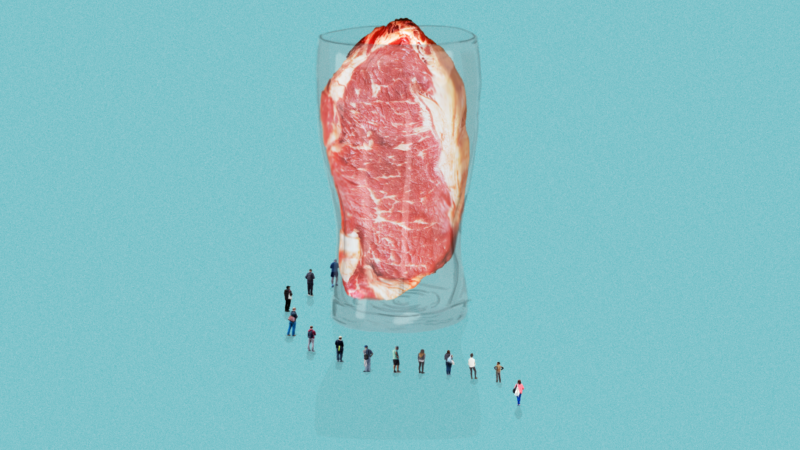Led Bib: Experimental five-piece get jazzy
Since their nomination for the 2009 Mercury Music Prize, Led Bib have become one of the most respected bands in a re-invigorated British jazz movement. Their five album discography demonstrates a broad sphere of influence and a desire to push the limits of harmony and improvisation. Ahead of their set at the Harley last month, Now Then caught up with the band for a little chat...
How did Led Bib get together?
Mark [drums]: We were all affiliated with the same university, Middlesex. I was doing my masters, which involved a project composing and performing music. Toby was in the first year, Chris was in his third and Pete had already graduated. Everyone already sort of knew each other so we ended up doing the project together. It just developed over the years as everyone had their own input.
Are you classically trained musicians?
Mark: Not necessarily classically trained. I studied classical music but I'm not a good enough classical player to do it as a job, certainly not at this point (laughs). We've all had formal training though.
Do you classify yourselves as a jazz band?
Mark: I'm always changing my mind. I do like to call it jazz because I see jazz as an open thing, a living art form. It's funny with jazz, because people like to put things in that category and say "this is what jazz is". But with rock, Captain Beefhart can be rock and so can Feist. How come they're allowed to be in the same category, whereas us and, say, Miles Davis aren't? The problem is that for a lot of people, jazz is a very specific sound; that sound from the 40s and 50s. If they think that our band is a jazz band, they won't check out what we're doing. It seems to put people off. It means that even though we get a lot of good press, it ends up in the jazz section of the paper which means that people who don't listen to jazz ordinarily just won't bother. It's only with things like getting on the television or getting on a more mainstream radio program that those people are able to say "oh, I didn't think I liked jazz, but maybe I do".
I hear a lot of different influences in your music....
Toby [keys]: Lots yeah, and that's the point I suppose. Even people like Miles Davis were influenced by a lot of funk and R'n'B and things like that. We all check out loads of new music all the time and we regularly share tunes and ideas with each other. I think that's what's making music like ours - and music by bands that you might term part of the "British jazz
movement" - interesting.
This idea of a new British jazz movement, bringing in fans from rock and jazz backgrounds, is interesting. Do you find that you are playing with lots of different acts these days?
Mark: It's a funny one. If we play a known jazz venue, we get people along to it that wouldn't normally come to a jazz gig. On the other hand, with rock gigs, I think that sometimes we're a bit weird on them, we sometimes feel a bit too jazzy for the crowd. Sometimes they go great as well though.
Do you enjoy the feeling of swimming against the tide?
Liran [bass]: For a long time I felt like the band was really going against something. There are a lot of collectives in this kind of music, especially in the UK, and we've somehow never felt part of it. In the beginning, you don't really feel like you want to be part of it, and that feeling grows stronger and stronger until you realise that you have a collective, we're making music that can only be identified as Led Bib. Even if we are swimming against the tide, it feels like a very positive thing. I think it's why we get such a good reaction to our records and live shows.
Do you think challenging what people expect is part of being a creative act?
Liran: Yeah, but I don't think it's conscious.
Mark: Maybe that's part of it. If you're really playing from your heart, you're bound to play something that's you.
To what extent do you feel like part of this "British jazz movement"?
Mark: We get lumped in with acts, like the various Mercury-nominated bands, and it's not that we don't like them, but we like to think of what we do as our thing, and I'm sure they'd like to think the same. People who like Polar Bear might not like Led Bib and vice versa. It ends up being, "these are the jazz musicians people might have heard of," like they're all one thing, when actually they're pretty disparate.
A big moment for the band must have been your 2009 Mercury nomination. The awards often come under criticism for nominating relatively unknown bands with little chance of winning the prize. How do you feel about that?
Liran: Pretty good (chuckles). Our culture has so much great music. Even if people can have a little glimpse of it, that's great. There's so much fantastic stuff that needs to be heard, and TV is such a great medium for that. The Mercury exposes types of music that people aren't necessarily familiar with. It is fantastic for whoever is representing the jazz section or the folk stuff, which is also very much shunted.
Do you think there is any chance that a jazz or folk act will win the prize eventually, or are they there as more of a token gesture?
Mark: I think they're probably genuine nominations, but I think it would be very hard for a jazz band to win. There would be a real outcry. I don't think that the mainstream press is quite ready for that yet. Even last year with Speech Debelle winning, that was a mainstream record but the press were pissed off! They thought Florence and the Machine should have got it, or La Roux or Kasabian. And that was a nice jazzy hip hop record - something to sit down to with your family!
Liran: We did an interview with Chris Moyles and he hated us! Throughout the whole show, he was constantly playing the theme to Batman over the top of our tunes. It's annoying, but he represents a lot of mainstream music so you can kind of understand it.
Mark: Yes, a jazz band could win, but it would never become a regular occurrence because if it kept happening, people would start to say that the Mercury is a load of bullshit, which they already say anyway. People often say it's tokenistic and trying to be like the art world, but music is art and even if it is a little bit tokenistic, you get bands who would never see the light of day who are gonna be on TV and people are gonna know about it.
Do you find the jazz scene different on the continent?
Toby: We love playing in Europe and we generally feel more supported. There seems to be a more open attitude towards stranger bands like ourselves. I think that has got a lot to do with the educational culture in our country. There's an almost museum-like attitude towards learning chops and licks, and where to play them. If you study English Literature then you will study Shakespeare, but you don't learn to quote his lines when you should be writing your own stuff.
Mark: I think some of it has to do with the crossover from American jazz culture, which seeps into Britain more than in Belgium or Germany. It can be a bit like "yeah, you really shot that sax player down". But America has the weight of tradition.
How do your own compositions come about? Through jams or are they more structured ideas?
Toby: Mark writes most of the tunes. I've written a couple and Chris has written a couple too.
Liran: Mark has a very clear vision of what he wants the band to sound like. He writes things as simply as he possibly can but he knows that the emotional part of the tune will come when the musicians bring it to life. It's a bit like Frankenstein. The beast starts as what he wanted and then grows bigger and bigger as the band gets involved. But you need to start with a really clear view of what you want to get, and I think that's where a lot of bands struggle.
How do you feel the band has evolved over your five releases?
Pete [alto sax]: I think it has massively, especially between Sensible Shoes and our last record, Bring Your Own. We went from touring a lot to recording new material and everybody agreed that we'd moved on a lot in terms of style, which in turn affects the way we improvise. As a band, we still do the same things we did on the first album, but if you were to cut out the middle albums and just listen to the first and the last, you'd really notice a difference. It's like getting old - you don't notice day to day until you look in the mirror and think, "Shit!"
Your live shows are very different to your records. Do you consider yourselves a live band or a studio band?
Mark: Both really. The recordings are like a snapshot of a gig. We're not trying to replicate a gig on our records but we want the albums to have that same spontaneity.
Tell us a bit about the two music videos you've done. Did you choose the animators?
Mark: The first one by Chiara Ambrosio was done right before the Mercury Prize show. We only had camera phone footage and they needed something proper. I eventually realised that we wanted something that could be viewed as art, rather than just getting a video of us playing. I put a call out through the Arts Council for people to work with and loads of artists got in touch. I saw Chiara's stuff and I really liked the stop-motion animation style. She had so little time to do it - I think she did the whole thing in two weeks.
The second time, I put out another call and got loads of more responses. This Japanese artist called Yui Hamagashira wrote in.
Pete: She put a phenomenal amount of work into it. I can't imagine how she built a visual relationship with the sound like she did. Her attention to what's going on sonically is incredible.
How do you define artistic independence?
Toby: An appealing part of what we do is that we can just get on with it.
Mark: Is this the right time to say we're backed by Glaxo Smith Kline..? )





